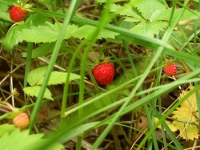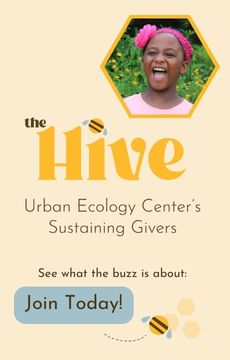
Research Lecture Series
2014 - 2015 Season
The Urban Ecology Center has been connecting our community with leaders in research, education, and sustainability through a monthly lecture series that began in 2001. Speakers in this series have included Sen. Gaylord Nelson, Carl Leopold, Bill McKibben, Wendell Berry, Richard Crossley and polar explorer Eric Larson. The series focuses on ten environmental issues we use to guide our education and recreation programs: clean water, climate and climate change, energy, transportation, food, consumption, healthy living, land-use, environmental justice, and biodiversity.
Through our Community Science program, the Urban Ecology Center also creates collaborative spaces for professional scientists and community researchers to perform original research. The lecture series provides an opportunity for our community members, students and interns to present their research.
September 30, 2014 - Riverside Park
Wetlands of the Penokee Hills
Speaker: Tracy Hames, Executive Director, Wisconsin Wetlands Association
Discover the beautiful, diverse and abundant wetland resources of the Bad River Watershed. Learn about the important role these wetlands play in helping maintain watershed health all the way downstream to the Kakagon/Bad River Sloughs estuary along Lake Superior. Also, learn up-to-date information about the proposed large taconite mine in this area.
October 14, 2014 - Washington Park
Water for Life: Community-science Water Quality Monitoring in Ecuador
Speaker: Catherine Woodward, Ceiba Foundation for Tropical Conservation
Teams of local volunteers in Ecuador donned rubber boots and followed local streams from source to sea, measuring water quality along the way. They found that streams in forested areas had higher water quality and better overall aquatic. Learn how community-collected data helped to prioritized riverside reforestation efforts.
November 10, 2014 - Menomonee Valley
ReFresh Milwaukee: Milwaukee’s Sustainability Plan
Speaker: Matthew Howard, Sustainability Director, City of Milwaukee
Matt Howard, City of Milwaukee Sustainability Director, will provide a general overview and update on implementation of the City’s ReFresh Milwaukee Sustainability Plan which sets a vision for community sustainability over a 10 year time frame. The Plan identifies measurable goals and targets across eight issue areas and two catalytic projects.
December 9, 2014 - Riverside Park
Student Research Presentations
Learn what cool things our research interns and students have been studying. This program will highlight student and volunteer research projects conducted at the Urban Ecology Center in 2014, including original research by the Young Scientists Club, an analysis of migration timing changes in birds, results of our park use surveys and more! Each student will present a short summary of his/her work.
January 20, 2015 - Riverside Park
Seventh Generation Earth Ethics: Native Voices of Wisconsin
Speaker: Patty Loew, PhD, Member of the Bad River Band of Lake Superior Ojibwe
Relive the toils and triumphs of caring for the earth from Wisconsin’s Native American Communities – and the philosophy that drives them. Loew profiles a dozen influential members from Wisconsin’s Indian Nations each of whom employ the “Seventh Generation Philosophy” to make environmental decisions based upon how those decisions will impact the land for seven generations to come, some 240 years in the future.
Click here for more info and to register
February 17, 2015 - Washington Park
Managed Grazing: Linking Food, People, Animals and the Environment
Speaker: Anders Gurda, The Grazing Ambassadors Project
Every day, three times a day, we make choices about the food we eat. Is it possible to choose food that positively impacts our taste buds, the earth and everything in between? Anders Gurda will discuss the practice of managed grazing and how it impacts Wisconsin’s environment and wildlife, livestock health and human nutrition.
Click here for more info and to register
March 10, 2015 - Riverside Park
The Once and Future Forest: Protecting and Managing Forest Biodiversity in a Highly Fragmented and Urban Landscape
Speaker: David Rogers, PhD, Dept of Biology, UW Parkside
Urban forests provide multiple benefits to the communities in which they exist, ranging from recreation to biodiversity protection. Using information from a variety of sources learn how the diversity of Milwaukee’s urban forests have changed over time and learn which environmental or social factors serve to protect or promote native plant species. In addition, explore how the rapid suburbanization in southeast Wisconsin has led to the conversion of agricultural areas into new forests stands and how these novel forest stands contribute to regional biodiversity, especially in floodplain forests.
Click here for more info and to register
April 7, 2015 - Menomonee Valley
Spider Silks & the ‘Nano’ World
Speaker: Dr. Sujatha Sampath, Research Professor, Physicist, University of Utah
Spider silks are fascinating natural fibers, which produce webs and egg cases and capture prey. They are extremely strong fibers and their superior material properties surpass those of any currently known man-made fiber. This talk will be about the nano-structure in spider silks, the link between its molecular structure and high mechanical strength, and why physicists, biologists and engineers alike are interested in this remarkable fiber, particularly in mimicking it for human applications.
Click here for more info and to register
April 14, 2015 - Washington Park
The Canary, the Miner and the Mine: Linking Social and Environmental Justice with Health Disparities and Equity in Birth Outcomes
Speaker: Emmanuel Ngui, DrPH, UW Milwaukee Zilber School of Public Health
This session will provide an overview of health disparities with a particular focus on disparities in birth outcomes and the linkages of these disparities to social and environmental justice. The session will explore some of the key social and environmental determinants of health disparities and potential strategies for building healthy social-ecological "niches" that promote health and health equity.
Click here for more info and to register
May 12, 2015 - Riverside Park
De-extinction: Can We and Should We Resurrect Extinct Species?
Speaker: Stanley A. Temple, Beers-Bascom Professor Emeritus in Conservation, University of Wisconsin
The possibility of de-extinction, resurrecting a species after the last living individual has died, has started to transition from “Jurassic Park” science fiction to science. For 3.5 billion years of life on Earth, extinction has been forever, but rapidly advancing technologies in genetics, stem cells, and reproductive biology have made it possible to consider resurrecting extinct species, including the iconic Passenger Pigeon. That prospect raises many issues for the conservation community. Professor Temple will review the rapidly evolving de-extinction movement and offer some ideas for how to proceed “before the sabre-toothed cat is out of the bag.”
Click here for more info and to register
June 9, 2015 - Menomonee Valley
Green Milwaukee: A History of Our Parks and Open Space
Speaker: John Gurda, Milwaukee Historian
Milwaukee County is blessed with 15,000 acres of public green space – one of the largest holdings in urban America. It wasn’t always that way. I’ll be discussing the evolution of our stellar – and much endangered – park system from the days of tiny public squares and private beer gardens to the abundant challenges of the present.
World Wide Jam
What do the late Senator Gaylord Nelson, polar explorer Eric Larsen, South African conservationist Louis Liebenberg, poet Wendell Berry, Carl Leopold (late son of Aldo) and the
Copyright © 2023 The Urban Ecology Center



